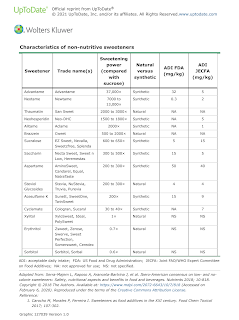Non-nutritive Sweeteners
Introduction
Non-nutritive sweeteners (NNS) are high-intensity sweeteners and are typically noncaloric or very low in calories.
- Due to recommendations to limit dietary sugary intake, NNS have become widely used, especially in food and beverages marketed as "sugar-free" or "diet".
NOTE: What do sugar content claims mean?
- Sugar Free: One serving contains less than 0.5 grams of sugars, both natural and added. (Also: free of sugar, sugarless, no sugar, zero sugar, or trivial source of sugar.)
- Reduced Sugar: Has at least 25% less sugars than the regular version of the product. (Also: less sugar, low in sugar or lower sugar.)
- No Added Sugar: No sugar or ingredient containing sugar was added during processing or packaging. (Also: without added sugar or no sugar added.)
Classification
Some non-nutritive sweeteners (NNS) are naturally occurring, plant-derived products, while others are synthetic ("artificial"). The sweetness of NNS is measured in comparison with a sucrose solution of 30 g/L, the minimal detection concentration range taste buds.
Uses
In the United States, 8 non-nutritive sweeteners (NNS) are permitted to be used as food additives, including saccharin, aspartame, acesulfame K, sucralose, neotame, advantame, stevia glycosides, and luo han guo fruit (monk fruit) extracts.
- The sugar alcohols (e.g., sorbitol, xylitol) are not considered food additives by the FDA.
NOTE: Consumption of non-nutritive sweeteners (NNS) should be minimized or avoided in those with underlying bowel disorders and in patients undergoing bariatric surgery.
Stability at High Temperature
Aspartame is unstable at high temperatures and cannot be used for baking or cooking.
Generally, acesulfame potassium, saccharin, stevia glycosides and sucralose are heat stable.
Phenylketonuria Risk
Aspartame is catabolized to phenylalanine among other compounds, making it unsafe for consumption in individuals with phenylketonuria.
Although advantame is a source of phenylalanine, the amount is much less than in aspartame and routine consumption of advantame is considered safe for those with phenylketonuria.
Health Effects
The consumption of products sweetened with non-nutritive sweeteners (NNS) may have health effects, including favourable effects (e.g., reduced risk of dental caries) and possibly negative effects (e.g., weight, glycemia, bowel function).
- The exact mechanisms by which consumption of NNS may adversely affect health is not definitively known but likely includes dysbiosis (changes in the gut microbiome), alterations in sweet preferences, and impacts on gut-brain signalling.
In May 2023, The World Health Organization (WHO) has released a new guideline on non-sugar sweeteners (NSS) which recommends against the use of NSS to control body weight or reduce the risk of noncommunicable diseases (NCDs).
- The recommendation is based on evidence of low certainty overall, from a systematic review that assessed the health effects of higher compared with lower intake of NSS. The systematic review found no evidence of long-term benefit on measures of body fatness in adults or children, and potential undesirable effects from long-term use in the form of increased risk of type 2 diabetes, CVDs and mortality in adults. Limited evidence suggests potential undesirable effects in the form of increased risk of preterm birth with NSS use during pregnancy.
NNS and Cancer
In the 1970s, animal studies raised concerns that saccharin caused bladder cancer in rodents, and the FDA removed saccharin's GRAS ("Generally Regarded as Safe") designation in 1977. However, further evaluation demonstrated no relationship between saccharin consumption and the development of malignancies in humans, and the GRAS designation was restored.
- Although limited observational data suggest a possible weak association between the consumption of NNS with cancer, there is no high-quality evidence that any of the available NNS increase the risk of cancer in humans.
Summary
Non-nutritive sweeteners are not a substitute for a healthy diet and regular exercise.
- It is important to focus on making healthy choices about the foods you eat and the amount of physical activity you get.
External Links
- UpToDate - Overview of non-nutritive sweeteners
- WHO advises not to use non-sugar sweeteners for weight control in newly released guideline, 2023
- Artificial Sweeteners and Cancer, 2009
- Sugar substitutes: Health controversy over perceived benefits, 2011
- High-Intensity Sweeteners, 2014
- Food Packaging Claims, 2017
- Aspartame and Other Sweeteners in Food
- What’s the Difference Between Sugar Free and No Added Sugar?, 2020

Comments
Post a Comment